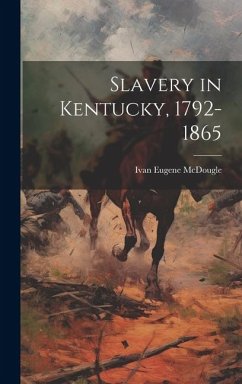This groundbreaking study explores the complex history of slavery in one of the border states of the American South. Drawing on a wide range of primary sources, including slave narratives, plantation records, and legal documents, McDougle examines the ways in which slavery evolved in Kentucky from its earliest days to the Civil War. Along the way, he exposes the harsh realities of slave life, the resistance and rebellion of enslaved people, and the efforts of abolitionists to bring an end to this inhumane institution. With its rigorous research and engaging prose, Slavery in Kentucky is a compelling and insightful work of history. This work has been selected by scholars as being culturally important, and is part of the knowledge base of civilization as we know it. This work is in the "public domain in the United States of America, and possibly other nations. Within the United States, you may freely copy and distribute this work, as no entity (individual or corporate) has a copyright on the body of the work. Scholars believe, and we concur, that this work is important enough to be preserved, reproduced, and made generally available to the public. We appreciate your support of the preservation process, and thank you for being an important part of keeping this knowledge alive and relevant.
Hinweis: Dieser Artikel kann nur an eine deutsche Lieferadresse ausgeliefert werden.
Hinweis: Dieser Artikel kann nur an eine deutsche Lieferadresse ausgeliefert werden.








